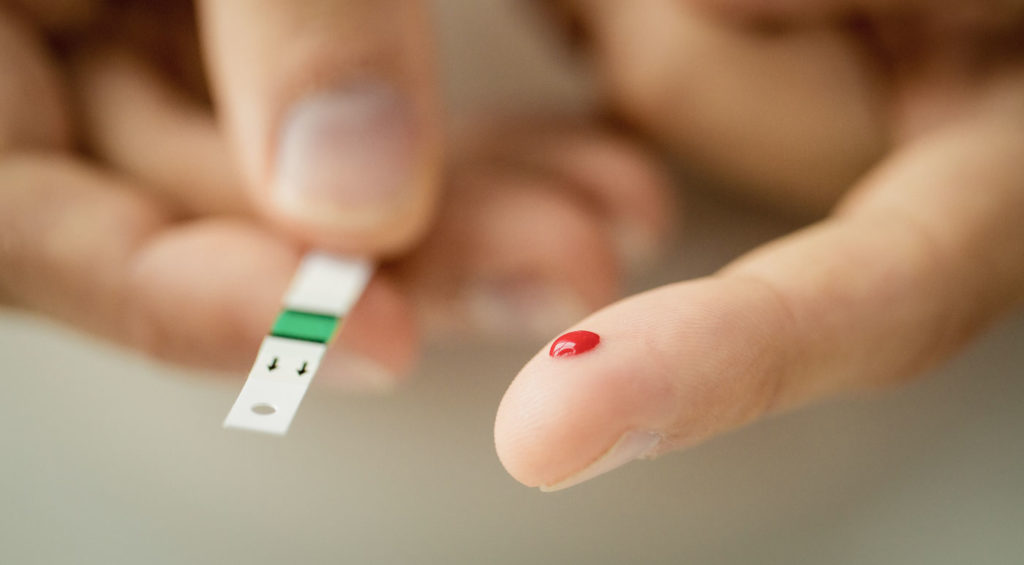
Can CBD oil help control or even prevent diabetes? We’ve taken a deep dive into the research to find out if it’s worth trying to use CBD oil for diabetes control.
Featured CBD Brands:
- Best Overall: Kanibi - Full Spectrum CBD Oil
- Best Value: Blue Moon Hemp - CBD Tinctures
- Best THC-Free: Kat's Naturals
Table of Contents
- Why It May Be Helpful to Use CBD Oil for Diabetes Control
- CBD and Diabetes
- Studies on Cannabis, CBD, and Diabetes
- Studies Looking at Diabetes and Cannabis
Why It May Be Helpful to Use CBD Oil for Diabetes Control
Diabetes is a disease where the control of blood sugar levels is lost. In Type 1 diabetes, the immune system attacks and destroys the insulin-producing cells in the pancreas. In Type 2 diabetes, the most common form, the cells of the body become resistant to the actions of insulin—this is known as insulin resistance.
The endocannabinoid system (which has the molecular binding sites for CBD and other cannabinoids) has been found to play a role in obesity—and in diabetes—mainly by increasing inflammation and a cellular process known as oxidative stress. CBD and another cannabinoid, Δ9-tetrahydrocannabivarin (THCV) may block these processes and, in theory, possibly block insulin resistance and help control diabetes.
CBD and Diabetes

Diabetes is a complex disease that takes years to develop and where the lack of control over blood sugar damages multiple organs and organ systems. This damage is due to inflammation and the effects of oxidative stress, a process that can be thought of as a form of inflammation.
CBD has both anti-inflammatory and antioxidant (to combat oxidative stress) effects. This may prove to be the basis of any usefulness of CBD oil for diabetes. Since the endocannabinoid system has a regulatory role in metabolism and plays a role in the control of weight, blood sugar, the immune response, and other factors important in the development of diabetes, it is certainly possible that CBD and other cannabinoids may play some future role in prevention of and possible treatments for diabetes.
There are a few key things to keep in mind about CBD oil and diabetes:
- At this point, there don’t seem to be many strong reasons to recommend CBD oil for the treatment of diabetes.
- There is no good reason to change any dietary, lifestyle, or medication approaches to controlling diabetes if they are doing a good job of controlling blood sugar levels.
- There may be good reasons to use CBD to prevent and help control inflammation, blood sugar levels, and some of the complications of diabetes.
- CBD applied topically may be useful to help prevent nerve damage (peripheral neuropathy) caused by diabetes, but currently, there are no good studies to support this.
- CBD has an excellent safety profile with few reported side effects (mainly nausea and fatigue) and may be helpful for people with diabetic pain and other complications of diabetes. So if you want to use CBD oil for diabetes-related pain—go for it. At this point, however, the information on the effectiveness of using CBD oil for controlling diabetes itself is very preliminary. Stay tuned, though, as research is moving quickly in this area.
Studies on Cannabis, CBD, and Diabetes

One study is often mentioned to support the use of cannabinoids by people with diabetes. This was a study out of the UK, which looked at CBD and THCV. It was a small pilot study, with 62 people enrolled. It was, however, a “gold-standard” study because it was randomized, double-blinded, and placebo-controlled.
The results indicated that THCV decreased fasting blood sugar levels and improved the function of insulin-producing cells. THCV also improved the levels of several biomarkers that are important in diabetes. CBD improved other biomarkers as well.
Altogether, the results of this study were promising, but not really conclusive. In other words: Stay calm, people, and keep breathing—it looks good, but it’s not a hit out of the ballpark when it comes to using CBD oil for diabetes. It is fair, however, to say that many studies are coming up with promising results—after all, we do know a few other things about CBD and diabetes.
First, CBD was shown to decrease the rate of appearance of diabetes in an experimental mouse diabetes model. In the same study, inflammatory chemical messengers (eg. IFN-γ and TNF-α) were reduced, and immune-cell-directed damage to insulin-producing cells was decreased. The same group also showed that autoimmune diabetes, a model for human Type 1 diabetes, was slowed down by using CBD.
We also know that the endocannabinoid system—the naturally occurring regulatory pathways that cannabinoids like CBD bind to—is critically important in the control of blood sugar and blood fats, as well as the immune response.
Third, we know that the endocannabinoid system is involved in appetite, weight control, blood sugar metabolism, fat cell metabolism, fat metabolism in the liver, and other biochemical functions—including inflammation and oxidative stress, which are both important in the development of diabetes and pre-diabetes.
In other studies, CBD was able to reduce inflammation and oxidative stress in mouse models of diabetic retinopathy, a serious eye complication of diabetes. In rat models of kidney complications in diabetes, a synthetic drug called rimonabant (RIO) seemed to be able to reduce kidney damage. RIO also seems to reduce nerve damage in animal models of diabetes.
There’s one more bit of information that’s led some researchers to believe that cannabinoids may (in the future) be useful in diabetes management:
- Rimonabant (RIO) acts to block the CB1 receptor. Preclinical trials indicated that RIO could be useful to reduce weight and improve blood sugar profiles. RIO was taken off the market because of serious psychiatric side effects, but clearly showed that the endocannabinoid system could be important in the control of diabetes.
Studies Looking at Diabetes and Cannabis

The National Health and Nutrition Examination Survey III (NHANES III) is a large—really large—set of studies using both interviews and physical examination to get a “bird’s eye” overview of the state of health of adults in the U.S. One question the survey sought to answer was whether there is an association between diabetes and cannabis use.
- The study looked at over 10,000 people and concluded that marijuana use more than 5 times a month was associated with an approximately 66% lower chance of having diabetes.
These results could be interpreted as indicating that marijuana use can be useful in preventing diabetes, but that would be jumping the gun by quite a bit. It could also mean that these people had a better diet or exercised more frequently. Both of these characteristics are also associated with a decreased risk of diabetes.
- In another study based on NHANES data, other researchers found that marijuana use was associated with decreased levels of fasting insulin, a smaller waist circumference, and decreased measurements of insulin resistance—indicating again that marijuana use could potentially be associated with a lower risk of diabetes.
- Other studies showed a decreased risk of metabolic syndrome (which can increase the risk of diabetes) in those who reportedly used marijuana at least 100 times in the past, as compared to those who had never used marijuana.
Confused? I don’t blame you. At this point, the effectiveness of using CBD oil for diabetes hasn’t been proven, but there are indications that it could possibly be helpful. It’s important to note that all these studies were retrospective.
These types of studies can be very useful, but they do depend on people remembering accurately. And certain types of controls may be missing. Also, other important risk factors may be missed—in these retrospective studies, the researchers did not correlate the information with, for example, dietary factors or how much physical activity the people in the studies were engaging in—and both of these factors could have an effect on the results.
